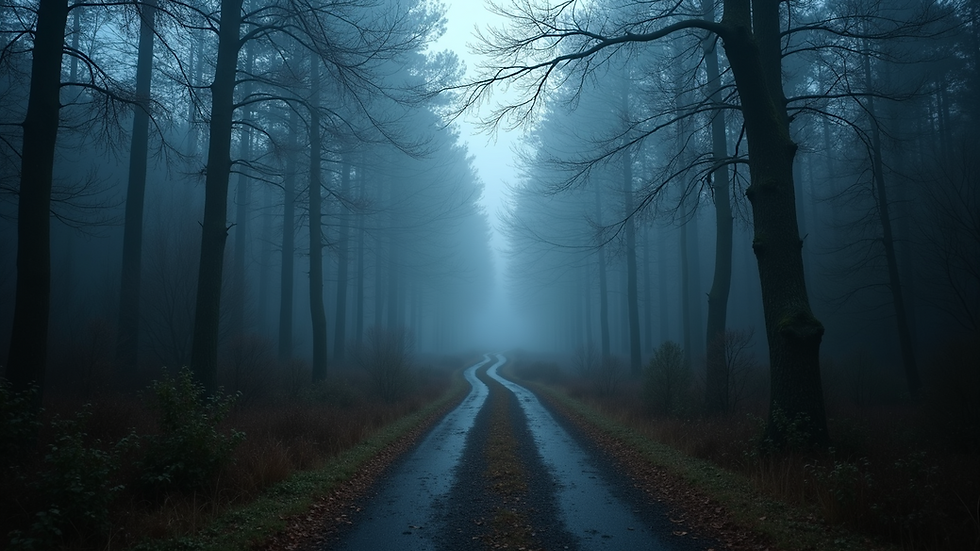How Psychological Thrillers Keep You on Edge
- Matteo B.

- Jul 28
- 4 min read
Psychological thrillers have a unique way of gripping audiences, pulling them into a world where the mind is both the battleground and the weapon. Unlike straightforward horror or action films, these stories delve deep into the complexities of human psychology, exploring fear, paranoia, and the fragile nature of reality. This genre thrives on tension, uncertainty, and the slow unraveling of truth, keeping viewers on the edge of their seats from start to finish.
The Anatomy of Psychological Thrillers: What Makes Them So Gripping?
At their core, psychological thrillers focus on the internal struggles of characters rather than external monsters or supernatural forces. The tension arises from mental conflict, unreliable narrators, and the blurred lines between sanity and madness. These films often explore themes such as identity, memory, trauma, and obsession.
Key elements that make psychological thrillers so compelling include:
Unpredictable Plot Twists: The story often takes unexpected turns, challenging viewers’ assumptions.
Complex Characters: Protagonists and antagonists alike are layered, flawed, and sometimes morally ambiguous.
Atmospheric Mood: Cinematography, sound design, and lighting work together to create a sense of unease.
Psychological Conflict: The tension is driven by mental and emotional struggles rather than physical threats.
This combination creates a slow-burning suspense that lingers long after the credits roll.

Why Psychological Thrillers Tap Into Our Deepest Fears
Unlike jump scares or gore, psychological thrillers tap into primal fears rooted in the mind. They exploit the fear of losing control, the terror of not knowing what is real, and the anxiety of being manipulated or deceived. This genre often reflects societal anxieties and personal insecurities, making the experience intensely personal and immersive.
For example, films like Black Swan explore the fear of losing one’s identity, while Gone Girl delves into the terror of betrayal and deception within intimate relationships. These stories resonate because they mirror real psychological struggles, magnifying them into suspenseful narratives.
The slow build-up of tension and the focus on mental instability create a claustrophobic atmosphere. Viewers are forced to question the reliability of what they see and hear, which heightens the sense of dread and anticipation.
Which are the best brain twisting psychological thriller movies ever made?
When it comes to brain twisting psychological thrillers, some films stand out for their intricate storytelling and unforgettable impact. These movies challenge viewers to piece together clues, question reality, and confront unsettling truths.
Here are a few standout examples:
Se7en (1995) - A dark, gritty exploration of human depravity and moral decay, with a shocking finale that leaves viewers haunted.
Fight Club (1999) - A cult classic that dissects identity, consumerism, and mental illness through a mind-bending narrative.
Shutter Island (2010) - A psychological mystery that blurs the line between reality and delusion on a remote island asylum.
Memento (2000) - Told in reverse, this film explores memory loss and the quest for truth in a fragmented narrative.
The Silence of the Lambs (1991) - A chilling cat-and-mouse game between an FBI trainee and a brilliant, psychopathic killer.
These films exemplify how psychological thrillers use complex characters and layered plots to keep audiences guessing until the very end.

For those interested in exploring more, the top psychological horror films list offers a curated selection that blends horror with mind-bending suspense.
The Role of Cinematography and Sound in Building Psychological Tension
Visual and auditory elements are crucial in psychological thrillers. Directors use camera angles, lighting, and sound design to create an unsettling atmosphere that mirrors the characters’ mental states.
Camera Work: Close-ups on characters’ faces reveal subtle emotions and growing paranoia. Unsteady or tilted shots can simulate disorientation.
Lighting: Shadows and low-key lighting evoke mystery and fear, while stark contrasts highlight moments of revelation or terror.
Sound Design: Ambient noises, eerie silences, and discordant music amplify tension. Sometimes, the absence of sound is just as powerful.
For example, in The Babadook, the use of shadow and sound creates a haunting presence that feels both psychological and supernatural. Similarly, Hereditary uses unsettling soundscapes to build dread gradually.
These techniques immerse viewers in the characters’ experiences, making the psychological tension palpable.
Psychological Thrillers as a Mirror to Society’s Anxieties
Beyond entertainment, psychological thrillers often reflect broader cultural and societal fears. They explore themes like:
Isolation and Alienation: Many thrillers depict characters cut off from society, highlighting fears of loneliness and disconnection.
Mental Health Stigma: Films often portray struggles with mental illness, sometimes challenging stereotypes or exposing misunderstandings.
Trust and Deception: Stories frequently revolve around betrayal, manipulation, and the fragility of relationships.
Power and Control: The battle for dominance, whether psychological or physical, is a recurring motif.
By tapping into these anxieties, psychological thrillers resonate on a deeper level. They force audiences to confront uncomfortable truths about themselves and the world around them.

How to Get the Most Out of Watching Psychological Thrillers
To fully appreciate psychological thrillers, consider these tips:
Watch Actively: Pay attention to details, dialogue, and visual cues. These often hold the key to understanding the plot twists.
Avoid Spoilers: The impact of these films relies heavily on surprise and revelation.
Reflect After Viewing: Take time to think about the themes and character motivations. Discussing with others can deepen your understanding.
Explore Different Subgenres: Psychological thrillers can overlap with horror, noir, or mystery. Trying various styles broadens your appreciation.
Use a Comfortable Setting: A quiet, dimly lit room enhances immersion and mood.
By engaging thoughtfully, you can experience the full emotional and intellectual impact of these films.
Psychological thrillers are a masterclass in suspense, weaving together narrative complexity, emotional depth, and atmospheric tension. They challenge viewers to question reality and confront the darker corners of the human mind. Whether you’re drawn to the slow burn of psychological horror or the intricate puzzles of mind games, this genre offers a rich and rewarding experience that keeps you on edge long after the screen goes dark.



Comments